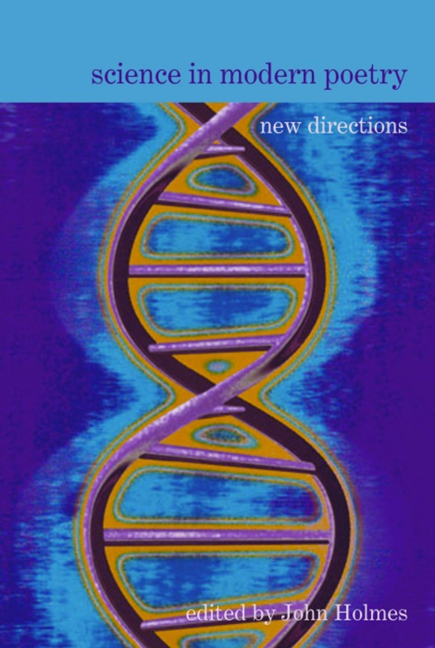Book contents
- Frontmatter
- Contents
- List of Contributors
- Acknowledgements
- Introduction
- Part I Science and Contemporary Poetry: Cross-Cultural Soundings
- Part II Science in Modernist Poetry: Appropriations and Interrogations
- 5 ‘Strange Synthetic Perfumes’: Investigating Scientific Diction in Twentieth-Century Poetry
- 6 The Human Animal: Biological Tropes in Interwar Poetry
- 7 William Empson, Ants and Aliens
- 8 Ezra Pound and the Materiality of the Fourth Dimension
- Part III Darwinian Dialogues: Four Modern Poets
- Afterword
- Bibliography
- Index
8 - Ezra Pound and the Materiality of the Fourth Dimension
from Part II - Science in Modernist Poetry: Appropriations and Interrogations
- Frontmatter
- Contents
- List of Contributors
- Acknowledgements
- Introduction
- Part I Science and Contemporary Poetry: Cross-Cultural Soundings
- Part II Science in Modernist Poetry: Appropriations and Interrogations
- 5 ‘Strange Synthetic Perfumes’: Investigating Scientific Diction in Twentieth-Century Poetry
- 6 The Human Animal: Biological Tropes in Interwar Poetry
- 7 William Empson, Ants and Aliens
- 8 Ezra Pound and the Materiality of the Fourth Dimension
- Part III Darwinian Dialogues: Four Modern Poets
- Afterword
- Bibliography
- Index
Summary
Towards the end of The Fifth Decad of Cantos (1937), resting between the historical turbulence of Cantos 48 and 50, celebrating the tranquillity of ancient Chinese order and applauding the pleasure and relaxation of pre-industrial labour, Pound's Canto 49 concludes on a note of particular quietude in its penultimate line: ‘The fourth; the dimension of stillness.’ A few years later, in a letter of June 1942 to Luigi Berti, we find a gloss on this quietude which remains one of only two open acknowledgements by Pound of the fourth dimension:
Stillness – the word is more concrete than IMMOTO [the motionless], for it also suggests silence. What is still is motionless and soundless. But the concept of motionlessness is more important in this line. In Dante, above the primum mobile there is the motionless, the sphere which does not turn. I conceive of a dimension of stillness which compenetrates the Euclidean dimensions. (Quoted in Bacigalupo, 1980, 78)
But such quietude and stillness are not achieved without a struggle – Canto 49 finishes ‘And the power over wild beasts.’ The syntax of this final couplet, compounded by the familiar disturbance of Pound's fragmentary exposition, renders uneasy any connection between its two halves. It is helpful only up to a point to refer back to Canto 47, which ends with the same line and which, in its evocation of the Eleusinian Mysteries, enables us to read this ‘power’ as that of Dionysus and his ‘gift of healing’. We need, in a sense, a simpler reading, which sets the two halves of the couplet against each other – stillness is achieved against a world of ‘wild beasts’, is maintained against a world that, from various perspectives, is threatening. And this struggle in itself, as I shall suggest later, is a central aspect of fourth-dimensional thought: the oppositional nature of such thought characterises not only its own procedures (where it is most productively seen as a process of being, rather than an accomplished state) but also its role as a tactic within the modernist armoury (see also Tryphonopoulos, 1990).
- Type
- Chapter
- Information
- Science in Modern PoetryNew Directions, pp. 130 - 148Publisher: Liverpool University PressPrint publication year: 2012

